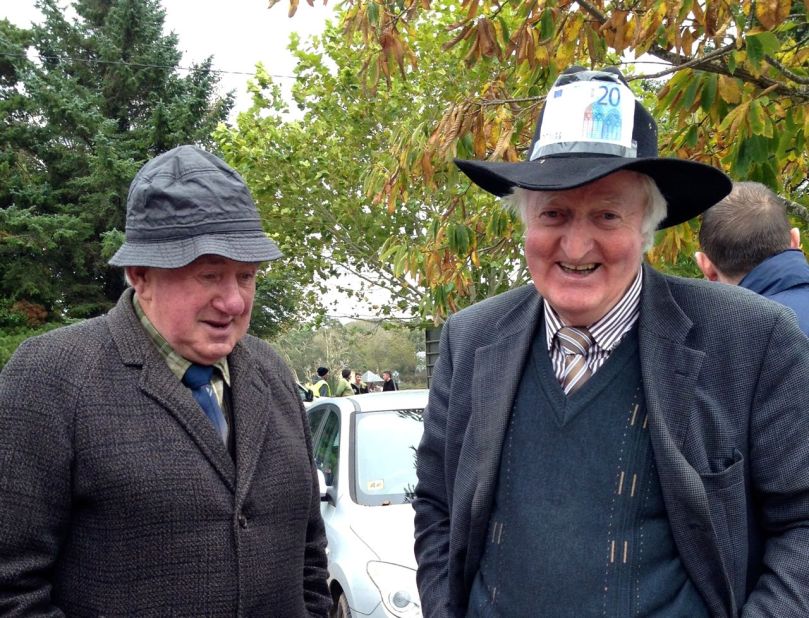You all did very well, Dear Readers, with learning to speak like a true West Cork denizen. I was especially proud of all the grands and likes you appended to your emails and comments. So, now, I think it’s time for the next couple of lessons.
I wish I could really capture for you the true cadence of the language here – the colourful vocabulary, the way stories are infused with a humorous acknowledgement of the foibles of the teller and the audience, the up-and-down rhythm of the speech, the expressiveness of all communication. But at least I can teach you some of the basics, so you will feel at home when you get here.
Lesson 3: Using the Conditional Tense
Today’s first lesson deals with the importance of mastering the conditional tense – in other words, using the word ‘would’ and all its variations, where the rest of the world would use the simple present or past tense. This has the effect of softening a statement in quite a delightful way, but it can also be confusing if you’re not used to it.
At a recent class I took, the instructor presented her credentials by saying, “I would have qualified in 1996.” Now, if someone outside West Cork had said that, you would have been waiting for the rest of the sentence…”Except that I failed the exam,” perhaps. But she was simply saying, in the West Cork way, “I qualified in 1996.” It’s just a bit more roundabout, a bit more diffident, a bit less assertive, than baldly stating a fact. Here’s how I normally say something, followed by how it is said in West Cork:
I got married in 2004.
I would have been married in 2004.
I don’t like jazz.
I wouldn’t be a huge fan of that kind of thing myself, now.
Hi, I’m Finola.
’Tis lovely to meet you. I would be Finola.
I’m always exhausted after yoga.
Sure, ’tis tiring, like, but you would feel great after it, wouldn’t you?
That guy is a crook.
He wouldn’t be the saintliest of fellas, like, but he would have had a hard time of it as a young lad.
I asked him to bring the umbrella.
I asked him would he bring the umbrella.
This will take some practice: set yourself the task of turning one declarative sentence a day into a conditional statement. You would want to spend a fair bit of time on it, like.
Lesson 4: Pronouns
Pronouns! Most of them are the same as English elsewhere, but with two important differences.
You/Ye. If you look up the word ye in a dictionary it will tell you the word is archaic, and died out in general usage several hundred years ago. Not in West Cork! It is in common usage, here and elsewhere in Ireland, as the plural of you. So, if you meet a group of people and are addressing them collectively, you say “How are ye?” I must say, this make eminent sense. How often do we have to qualify you by saying “I mean you, plural?” Or, “I mean both of you?”
Now so, are ye ready for the last biteen (we’ll deal with that word another day) of the lesson? On we go, so, to reflexive pronouns – those are the ones with self at the end of them. They are used in Ireland in a variety of ways. Himself and herself are sometimes used to denote a husband or wife, but also can have a slight suggestion of amusement or mockery.
Himself would be holding forth about politics the whole evening.
I’d like to stay a while longer, but herself has the tea on the table at six sharp.
Is it yourself? It is indeed.
It will be time for a quiz soon, so ye should study what we’ve learned so far and I’ll think about a suitable test, and maybe some prizes. Wouldn’t that be grand? Himself thinks so, too.





Ah now, don’t be talkin’, ’tis worse you’re gettin’ instead of betther. Would ye not make a shape of yourselves and get out on them rocks instead of blatherin’ on about the accent. ‘Course ’tis bitther in the winther, but sure you know yourself, like.
LikeLike
Ah now, when it comes to th’oul accent ’tis yourself does the grand job. I’m only in the ha’penny place.
http://www.roaringwaterjournal.com
>
LikeLike
Ah makes me miss the crap out of Ireland. Spent quite a bit of time in Cork, lovely city, can’t wait to return and hear the local speech again, good craic and great post! 🙂
LikeLike
‘Tis!
LikeLike
I would be after having a great read. Ah, now, sure ’tis a grand thing to have friends in West Cork.
LikeLike
Grand, like (sorry myself would be a little be behind the beat of ye)!
LikeLike
Not too far, Jens!
LikeLike
it’s a grand thing your doing, to be sure and I would be enjoying it…
LikeLike
Grand indeed, Perran!
LikeLike
How are ye? I’d be grand myself, thanks be to God!!
Can’t wait till you get on to ‘after’!!
LikeLike
Himself is grand and I’m trottin’ after.
LikeLike
Surely now, ’tis a wee bit o’ the banter I would be hearin’ cummin’ bang outta dem loovly photographs!
LikeLike
🙂
LikeLike
Grand post with some great images, like 🍀
LikeLike
Thanks – MM! Just got caught up with yours. Terrific photos and moving writing.
LikeLike
Thank you Finola, the writing bit was a bit out of the ordinary and not a ‘normal’ post, as I am sure you can see. 🍀
LikeLike
We’ve got enough trouble with Canadian English, or at least the West Coast version thereof.
LikeLike
Ah, now…
LikeLike
herself indoors thinks this is great fun like, its grand
LikeLike
And himself inside thinks the same.
LikeLike
I am wanting supper but himself is reading like.
LikeLike
Hope ye got to eat eventually!
LikeLike